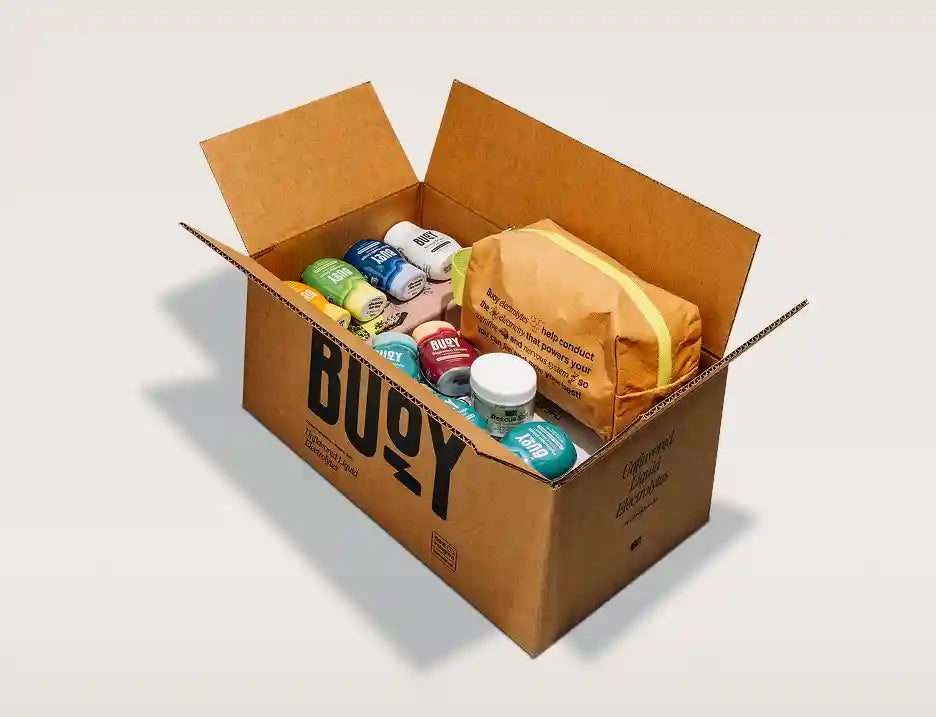
Can You Have Too Many Electrolytes?
Share
Electrolytes like sodium, potassium, calcium, and magnesium are essential for our health, regulating nerve signals, muscle function, and fluid balance. But is it possible to have too many electrolytes? Yes, and an imbalance can cause serious health problems.
Essential Takeaways
- Electrolytes are vital, but an excess can lead to severe health complications like high blood pressure, seizures, or heart issues.
- Using a balanced supplement like Buoy Hydration Drops can help you achieve optimal electrolyte levels without risking an overdose.
- Personal needs vary; monitoring your intake is key to staying balanced.
This guide explores what happens when your electrolyte levels are too high and how to maintain balance.
- Understanding Electrolyte Balance
- Can You Have Too Much Electrolytes?
- Symptoms of Too Many Electrolytes
- Can You Overdose on Electrolytes?
- How Much Electrolytes Is Too Much?
- Buoy’s Approach to Safe Electrolyte Balance
- How to Monitor Your Electrolyte Intake
- Achieving Balance with Buoy: Your Partner in Hydration
- Conclusion: Finding the Right Balance
Understanding Electrolyte Balance
Electrolytes are electrically charged minerals that help the body perform essential functions like nerve conduction and muscle contraction. The body meticulously regulates these electrolytes, keeping them within a narrow range known as electrolyte balance.
The Importance of Electrolyte Balance
Having the right electrolyte levels is crucial for overall health. These tiny minerals play a big role in:
-
Nerve Function: Electrolytes transmit electrical signals for reflexes and sensory perception.
-
Muscle Contraction: They enable muscles, including the heart, to contract smoothly.
-
Hydration: Electrolytes help regulate the flow of fluids in and out of cells.
-
Heart Function: They ensure a steady heartbeat and support cardiovascular health.
- pH Balance: Electrolytes maintain the body's acid-base balance, preventing it from becoming too acidic or alkaline.
An imbalance, whether too high or too low, can disrupt these processes and lead to health issues.
Can You Have Too Much Electrolytes?

Too many electrolytes? This visual shows how essential minerals like sodium, potassium, and magnesium can overflow—highlighting the importance of balance in electrolyte intake.
Yes, having too many electrolytes can lead to conditions such as:
-
Hyperkalemia: Excess potassium can cause muscle weakness, irregular heartbeat, and in severe cases, heart failure.
-
Hypernatremia: High sodium levels may lead to high blood pressure, confusion, and seizures.
- Hypercalcemia: Too much calcium can result in kidney stones, bone pain, and impaired brain function.
These issues are often caused by excessive intake of supplements, high-sodium diets, or impaired kidney function, which affects the body’s ability to maintain balance.
Symptoms of Too Many Electrolytes
If you have too many electrolytes, symptoms may include:
-
Headaches and fatigue
- Muscle cramps or spasms
- Irregular heartbeat
- Nausea or vomiting
- High blood pressure
- Confusion or irritability
In severe cases, electrolyte imbalances can lead to life-threatening conditions like seizures or heart arrhythmias. Recognizing these symptoms early can help prevent serious complications.
Can You Overdose on Electrolytes?

While vitamins like B6, B7, and B9 are vital for health, excessive intake—just like with electrolytes—can lead to imbalances. This image symbolizes the fine line between beneficial and too much when it comes to supplements.
While rare, an electrolyte overdose -especially from supplements -can occur if large doses are consumed without guidance. Overconsuming potassium or sodium in particular can strain the kidneys, cause digestive upset, or impact heart function. In extreme cases, this can lead to electrolyte toxicity or electrolyte poisoning, which requires urgent medical attention. Unlike food-based sources, electrolyte drinks and supplements often have concentrated levels of minerals. That's why it's important to follow serving size guidelines, space intake throughout the day, and listen to your body. When in doubt, consult a doctor, especially if you have high blood pressure, kidney conditions, or heart issues.
How Much Electrolytes Is Too Much?
The amount of electrolytes you need depends on your activity level, diet, and overall health. Athletes and individuals in hot climates may require more, but excessive supplementation without medical guidance can easily lead to an overload.
General Guidelines:
Sodium: Keep daily intake under 2,300 mg to avoid high blood pressure risks.
Potassium: The recommended daily intake is around 3,500–4,700 mg for adults.
Calcium: Aim for 1,000–1,200 mg per day for optimal bone health.
Magnesium: Aim for 300–400 mg per day, its usually sufficient for most adults.
Consult a healthcare provider if you’re unsure about the right dosage, especially if you’re using supplements.
Is It Bad to Drink Electrolytes Every Day?
Electrolytes are safe and beneficial for daily use, but only when consumed in proper amounts. People on low-carb diets (like keto), athletes, or those who sweat heavily often need electrolyte support every day. However, drinking too many electrolyte drinks in one day, especially those with high sodium or added sugar, may lead to unwanted side effects like bloating, diarrhoea, or blood pressure spikes. Products like Buoy Hydration Drops offer a safe, balanced option - zero sugar, zero calories, and no artificial additives - so you can hydrate daily without the risks that come with traditional sports drinks or overly concentrated formulas.
Buoy’s Approach to Safe Electrolyte Balance
Buoy’s Hydration Drops are designed to provide a balanced blend of essential electrolytes without risking an overdose. Unlike many sugary sports drinks, Buoy offers a carefully formulated solution that supports hydration and overall health.
Key Benefits of Buoy Drops:
-
Provides balanced electrolytes like sodium, potassium, magnesium, and calcium.
-
Supports hydration without excess sugars or artificial ingredients.
- Easy to use in any drink, helping you maintain safe electrolyte levels.
How to Monitor Your Electrolyte Intake
Electrolyte needs can vary widely based on lifestyle, health conditions, and diet. Here’s how to keep your levels in check:
-
Track Your Intake: Monitor how much sodium, potassium, and other electrolytes you consume through food and supplements.
-
Be Aware of Medications: Diuretics, blood pressure medications, and certain treatments can alter your electrolyte balance.
-
Listen to Your Body: Fatigue, muscle cramps, and irregular heartbeat can be signs of an electrolyte imbalance.
- Consult a Healthcare Provider: If you have a medical condition like kidney disease or are on a special diet (e.g., keto), check your electrolyte levels regularly.
Achieving Balance with Buoy: Your Partner in Hydration
Buoy Hydration Drops offer a practical way to maintain electrolyte balance throughout the day, whether you’re an athlete, following a keto diet, or just trying to stay hydrated.
-
Hydration Drops: These drops transform your regular drinks into hydration powerhouses.
-
Energy Drops: Boost your energy levels while ensuring safe electrolyte intake.
- Immunity Drops: Enhance your body’s defenses with balanced electrolytes and immune-supporting ingredients.
For comprehensive hydration and wellness, try Buoy’s Daily Wellness Bundle, which combines all three for a complete approach to health.
Can you overdose on electrolytes?
Yes, you can overdose on electrolytes, especially through excessive supplementation. This usually happens when people take high doses of sodium, potassium, or magnesium without accounting for their diet, sweat loss, or health status. Symptoms may include nausea, vomiting, diarrhoea, muscle weakness, or even irregular heartbeat. In severe cases, it could lead to seizures or kidney stress. Overdosing is rare with food-based sources but easier to do with powders, pills, or drinks. That’s why products like Buoy offer balanced, safe dosages designed for daily hydration support without overloading your system.
What are the symptoms of too many electrolytes?
Common symptoms of too many electrolytes include fatigue, confusion, muscle cramps, irregular heartbeat, high blood pressure, or nausea. These often depend on which mineral is too high. For instance, too much potassium (hyperkalemia) may cause heart palpitations, while too much sodium (hypernatremia) can lead to bloating or dizziness. In extreme cases, electrolyte imbalance can cause seizures or organ dysfunction. If you’re using electrolyte supplements regularly and notice these symptoms, it’s important to cut back and speak to a healthcare provider. Monitoring your intake and choosing low-dose formulas like Buoy can help prevent these issues.
How much is too much electrolytes in one day?
There’s no one-size-fits-all answer, but here are general daily upper limits for healthy adults:
-
Sodium: Under 2,300 mg
-
Potassium: No more than 4,700 mg
-
Magnesium: 400–420 mg (men), 310–320 mg (women)
-
Calcium: 2,000–2,500 mg
Going well above these amounts, especially with supplements or sports drinks, can increase your risk of side effects. If you’re using multiple electrolyte products or have a diet already rich in salty or fortified foods, monitor total intake. A measured product like Buoy makes it easier to stay within safe boundaries.
Can drinking too many electrolyte drinks cause diarrhoea?
Yes, drinking too many electrolyte drinks can sometimes lead to diarrhoea. This happens because excess minerals - especially magnesium or potassium - can have a laxative effect when taken in large amounts. Some electrolyte beverages also contain sugar alcohols or artificial sweeteners that may irritate the digestive system. To avoid this, stick with clean-label supplements like Buoy, which are free from sugars and artificial additives and designed for gentle, balanced hydration. If you notice bloating or loose stools after drinking electrolyte beverages, reduce the amount or frequency and consider switching to a more balanced formula.
Can you drink electrolyte water every day?
Yes, drinking electrolyte water every day can be beneficial - if done in moderation. People who sweat often, eat a low-carb diet, or live in hot climates typically need daily electrolyte support. But overdoing it, especially with high-sodium or sugary drinks, can be counterproductive. It’s best to choose a low-dose, sugar-free option like Buoy and use it throughout the day as needed. You don’t need high doses unless you're extremely active or experiencing heavy fluid loss. The key is consistency and balance, hydrating enough to support your body without overloading it.
What happens if you drink too many electrolytes?
Drinking too many electrolytes can throw off your body’s natural balance, leading to symptoms like bloating, high blood pressure, dizziness, or irregular heart rhythm. It’s especially important to watch sodium and potassium levels, as both can cause serious health issues in excess. Overuse of concentrated drinks or powders can cause digestive upset or even kidney strain over time. If you're unsure how much you need, it's better to start small and increase gradually. Products like Buoy are formulated for daily, balanced use, reducing your risk of overconsumption while keeping hydration on point.
Conclusion: Finding the Right Balance
Electrolytes are vital for keeping your body running smoothly, but balance is key. Too many electrolytes can lead to serious health issues, so it’s important to monitor your intake and use a balanced supplement like Buoy for safe hydration.
Ready to optimize your hydration? Try Buoy’s Hydration Drops today and experience the benefits of balanced electrolytes without the risks of an overload.




